外研社新标准英语初中八年级上册《MODULE 4 Educatio
- 格式:ppt
- 大小:3.24 MB
- 文档页数:24
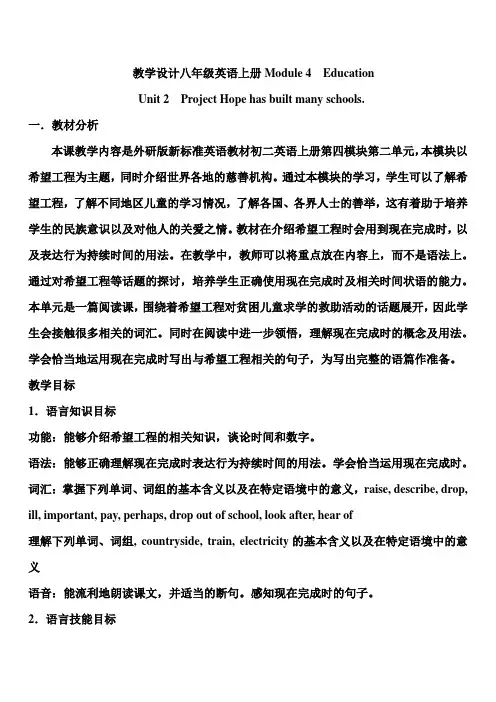
教学设计八年级英语上册Module 4 EducationUnit 2 Project Hope has built many schools.一.教材分析本课教学内容是外研版新标准英语教材初二英语上册第四模块第二单元,本模块以希望工程为主题,同时介绍世界各地的慈善机构。
通过本模块的学习,学生可以了解希望工程,了解不同地区儿童的学习情况,了解各国、各界人士的善举,这有着助于培养学生的民族意识以及对他人的关爱之情。
教材在介绍希望工程时会用到现在完成时,以及表达行为持续时间的用法。
在教学中,教师可以将重点放在内容上,而不是语法上。
通过对希望工程等话题的探讨,培养学生正确使用现在完成时及相关时间状语的能力。
本单元是一篇阅读课,围绕着希望工程对贫困儿童求学的救助活动的话题展开,因此学生会接触很多相关的词汇。
同时在阅读中进一步领悟,理解现在完成时的概念及用法。
学会恰当地运用现在完成时写出与希望工程相关的句子,为写出完整的语篇作准备。
教学目标1.语言知识目标功能:能够介绍希望工程的相关知识,谈论时间和数字。
语法:能够正确理解现在完成时表达行为持续时间的用法。
学会恰当运用现在完成时。
词汇:掌握下列单词、词组的基本含义以及在特定语境中的意义,raise, describe, drop, ill, important, pay, perhaps, drop out of school, look after, hear of理解下列单词、词组, countryside, train, electricity的基本含义以及在特定语境中的意义语音:能流利地朗读课文,并适当的断句。
感知现在完成时的句子。
2.语言技能目标听:能听懂有关希望工程背景的介绍,获取准确信息。
说:在情境中运用现在完成时描述与希望工程相关的信息。
并且能够复述课文。
读:运用适当的阅读策略找出文章的主题,理解大意,获取与希望工程相关的信息。
写:能运用现在完成时描述希望工程所做的工作,恰当使用and,or,but 等连接词表示顺序和逻辑关系。
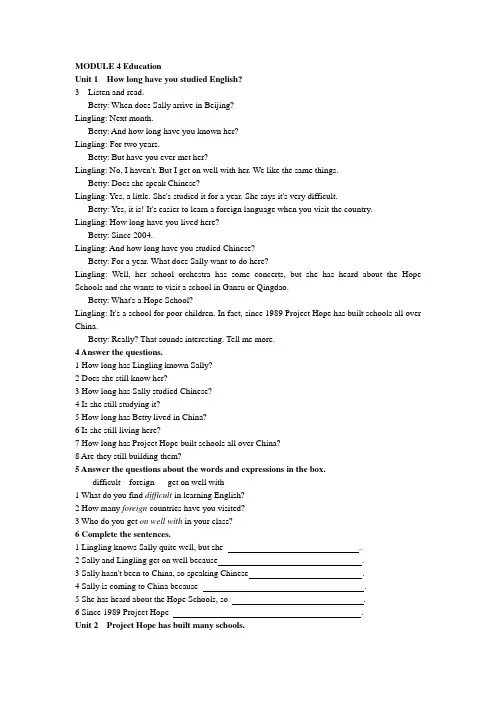
MODULE 4 EducationUnit 1 How long have you studied English?3 Listen and read.Betty: When does Sally arrive in Beijing?Lingling: Next month.Betty: And how long have you known her?Lingling: For two years.Betty: But have you ever met her?Lingling: No, I haven't. But I get on well with her. We like the same things.Betty: Does she speak Chinese?Lingling: Yes, a little. She's studied it for a year. She says it's very difficult.Betty: Yes, it is! It's easier to learn a foreign language when you visit the country.Lingling: How long have you lived here?Betty: Since 2004.Lingling: And how long have you studied Chinese?Betty: For a year. What does Sally want to do here?Lingling: Well, her school orchestra has some concerts, but she has heard about the Hope Schools and she wants to visit a school in Gansu or Qingdao.Betty: What's a Hope School?Lingling: It's a school for poor children. In fact, since 1989 Project Hope has built schools all over China.Betty: Really? That sounds interesting. Tell me more.4 Answer the questions.1 How long has Lingling known Sally?2 Does she still know her?3 How long has Sally studied Chinese?4 Is she still studying it?5 How long has Betty lived in China?6 Is she still living here?7 How long has Project Hope built schools all over China?8 Are they still building them?5 Answer the questions about the words and expressions in the box.difficult foreign get on well with1 What do you find difficult in learning English?2 How many foreign countries have you visited?3 Who do you get on well with in your class?6 Complete the sentences.1 Lingling knows Sally quite well, but she .2 Sally and Lingling get on well because .3 Sally hasn't been to China, so speaking Chinese .4 Sally is coming to China because .5 She has heard about the Hope Schools, so .6 Since 1989 Project Hope .Unit 2 Project Hope has built many schools.Read the passage and choose the main idea.1Helping poor children go to school2Talking about education3Describing life for poor families3 Answer the questions.1 Did Liu Sanzi finish studying?2 Why did Li Yinming stop going to school?3 When did he stop going to school?4 What has Project Hope raised money for?5 Did Shen's school have lots of books last year?6 Who has given money to Project Hope?4 Match the words and phrases with their meanings.drop out of school help pay for train1 to give money to buy something2 to do something for someone3 to leave before you've finished studying4 to teach someone to do something5 Answer the questions about the words and expressions in the box.abroad countryside electricity look after project iii1 Who looks after you when you're ill?2 Where do people go when they go abroad?3 Where is the nearest countryside to your school?4 What kind of projects do you do at school?5 What will happen without electricity?Learning to learnYou use words like and ,or and but to join two sentences. Project Hope has built schools. Project Hope has built libraries. Project Hope has built schools and libraries.Unit 3 Language in useLanguage practiceHow long have you studied Chinese? For a year.How long have you lived here? Since 2004.She's studied if for a year.Since 1989 Project Hope has built schools all over China.1 Work in groups of six. Make questions to ask everyone in the group.Try to find a different name to write for each answer.Find someone who ... Name1 has been to England.2 has worn glasses for more than three years.3 has lived in the same house for more than five years.4 has had the same best friend since primary school.5 hasn't been to the seaside since last year.A: Wang Tong, have you been to England?B: No, I haven't.A: Li Hug have you been to England?C: Ns, I have!A: OK. I'll write your name. Next question. Have you ...2 Write questions. Use How long have I has ... ?Lingling / study English? How long has Lingling studied English?1 Tony / know Daming?2 Betty / live in Beijing?3 Betty and Tony / study Chinese?4 Betty and Tony / be at Beijing International School?5 Betty / know about Project Hope?3 Complete the sentences with the correct form of the verbs and for or since.Lingling has studied (study) English forr nearly six years.1 Tony (know) Daming September 2003.2 Betty (live) in Beijing 2003.3 Betty and Tony (study) Chinese a year.4 Betty and Tony (be) at Beijing International School last year.5 Betty (know) about Project Hope one day. Lingling told her about it yesterday.4 Work in pairs. Write a short conversation. Use the questions and give your own answers. How long have you ... ?1 known your oldest friends2 studied English 4 known your teacher3 lived in your city 5 been at school5 Underline the correct answers.I have known / knew my best friend since we(l) have been / were four years old. Her name is Natalie. She (2) has lived / lived next door to me in Guangzhou but then her parents (3) have moved / moved to another city. We (4) have written / wrote letters to each other. Luckily, her dad (5) has just started/just started a new job so they (6) have moved / moved back to Guangzhou. I am very happy! We (7) have seen / saw each other every day since she came back.6 Complete the passage about Project Hope. Use the correct form of thewords and expressions in the box.abroad difficult drop out of help pay for study thousands of trainProject Hope has raised money from people at home and abroad. It helps (1) children who can't go to school. It (2) their education. It builds schools and libraries and it (3) teachers. Some children in the countryside (4) school because they have to (5) with the farm work. We can go to school and (6) , but for poor children it's (7) to go to school.8 Match the words with the numbers.1 a billion a 6.22 four thousand b 1,000,000,0003 three hundred and twenty c 9.434 five million d 4,0005 six point two e 12.366 twelve point three six f 3207 nine point four three g 5,000,0009 Replace the numbers in the passage with words.Project HOPE is also the name of a world organisation that works to improve health care in the world. Project HOPE has worked around the world for 46 years. It has trained over 2,000,000 people to help poor children and adults. Project HOPE gives about 1,000,000 dollars of help to 20 to 30 countries. Over 5,000 Workers and teachers have worked for Project HOPE since it started.1 46 4 202 2,000,000 5 303 1,000,000 6 5,000Around the worldOxfamOxfam is an organisation which raises money for different projects. It helps poor people in countries around the world.Oxfam pays for clean water and schools. It has shops and sells fruit and coffee grown by poor farmers. It pays a fair price for their work. Rich people give clothes to the shops. Oxfam sells them and uses the money to pay for its projects.。
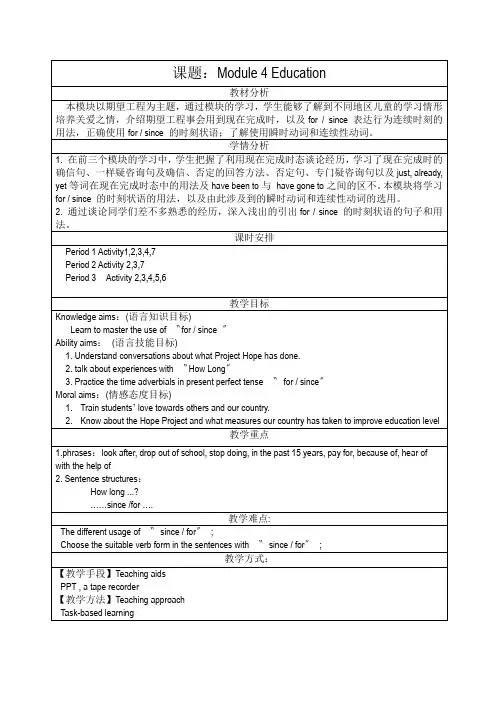
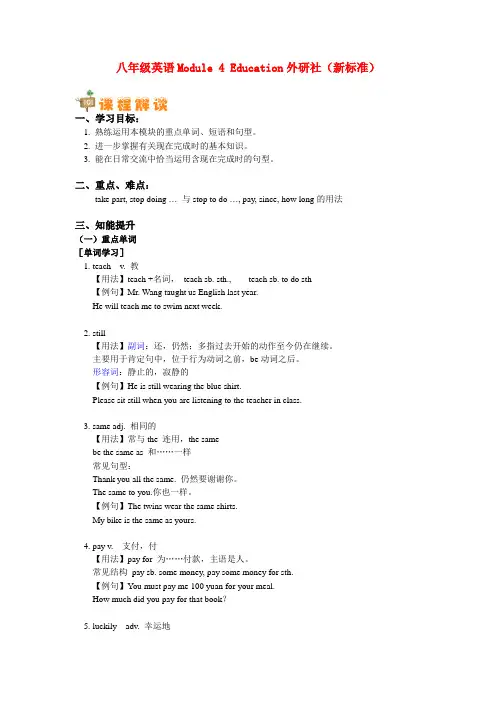
八年级英语Module 4 Education外研社(新标准)一、学习目标:1. 熟练运用本模块的重点单词、短语和句型。
2. 进一步掌握有关现在完成时的基本知识。
3. 能在日常交流中恰当运用含现在完成时的句型。
二、重点、难点:take part, stop doing …与stop to do …, pay, since, how long的用法三、知能提升(一)重点单词[单词学习]1. teach v. 教【用法】teach +名词,teach sb. sth., teach sb. to do sth【例句】Mr. Wang taught us English last year.He will teach me to swim next week.2. still【用法】副词:还,仍然;多指过去开始的动作至今仍在继续。
主要用于肯定句中,位于行为动词之前,be动词之后。
形容词:静止的,寂静的【例句】He is still wearing the blue shirt.Please sit still when you are listening to the teacher in class.3. same adj. 相同的【用法】常与the 连用,the samebe the same as 和……一样常见句型:Thank you all the same. 仍然要谢谢你。
The same to you.你也一样。
【例句】The twins wear the same shirts.My bike is the same as yours.4. pay v. 支付,付【用法】pay for 为……付款,主语是人。
常见结构pay sb. some money, pay some money for sth.【例句】You must pay me 100 yuan for your meal.How much did you pay for that book?5. luckily adv. 幸运地【考查点】luck n. lucky adj.【例句】Luckily, the teacher didn’t see me.Good luck to you!You are so lucky.6. point v. 指着,指向n. 点,分【例句】six point two 6.2D on’t point at others. It’s rude.【考题链接】老师正指着地图。
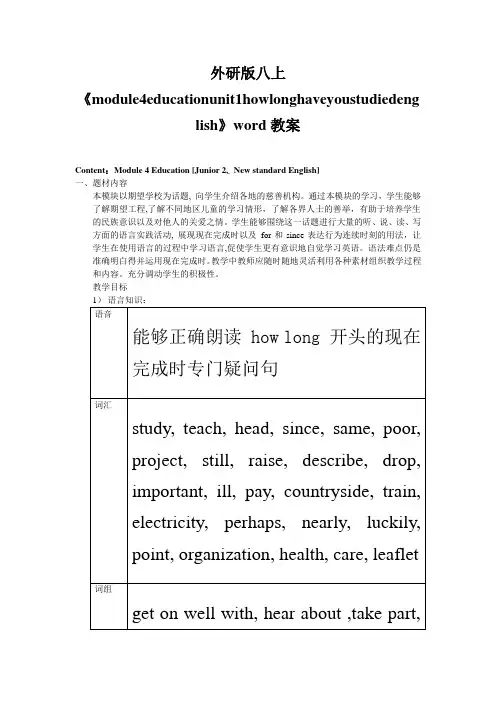
外研版八上《module4educationunit1howlonghaveyoustudiedenglish》word教案Content:Module 4 Education [Junior 2,New standard English]一、题材内容本模块以期望学校为话题, 向学生介绍各地的慈善机构。
通过本模块的学习,学生能够了解期望工程,了解不同地区儿童的学习情形,了解各界人士的善举,有助于培养学生的民族意识以及对他人的关爱之情。
学生能够围绕这一话题进行大量的听、说、读、写方面的语言实践活动, 展现现在完成时以及for和since表达行为连续时刻的用法,让学生在使用语言的过程中学习语言,促使学生更有意识地自觉学习英语。
语法难点仍是准确明白得并运用现在完成时。
教学中教师应随时随地灵活利用各种素材组织教学过程和内容。
充分调动学生的积极性。
教学目标语音能够正确朗读 how long 开头的现在完成时专门疑问句词汇study, teach, head, since, same, poor,project, still, raise, describe, drop,important, ill, pay, countryside, train,electricity, perhaps, nearly, luckily,point, organization, health, care, leaflet词组get on well with, hear about ,take part,5)情感态度:培养学生关爱他人的情感素养。
参加各种英语活动,感受学习的乐趣,克服困难,在新环境中进一步树立准确的语言学习观。
6)任务:能够收集有关期望工程的信息制作招贴画。
教学重点和难点重点:1.通过谈论期望工程训练学生的听、说、读、写能力,把握使用for和since的时刻状语。
难点:把握使用for和since的时刻状语,养成正确使用现在完成时的能力。
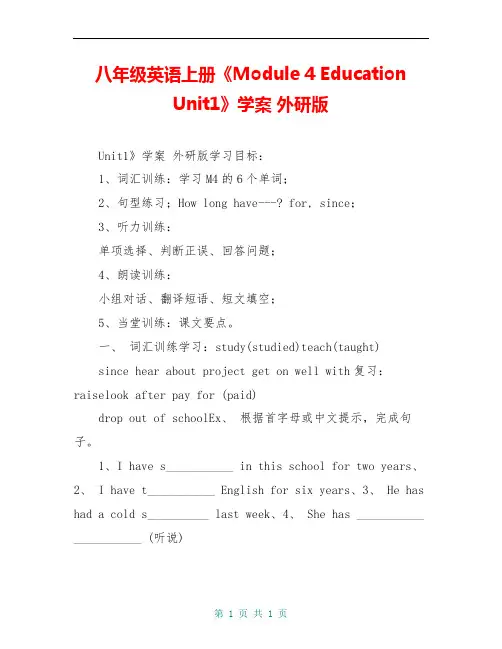
八年级英语上册《Module 4 EducationUnit1》学案外研版Unit1》学案外研版学习目标:1、词汇训练:学习M4的6个单词;2、句型练习;How long have---? for, since;3、听力训练:单项选择、判断正误、回答问题;4、朗读训练:小组对话、翻译短语、短文填空;5、当堂训练:课文要点。
一、词汇训练学习:study(studied)teach(taught)since hear about project get on well with复习:raiselook after pay for (paid)drop out of schoolEx、根据首字母或中文提示,完成句子。
1、I have s___________ in this school for two years、2、 I have t___________ English for six years、3、 He has had a cold s__________ last week、4、 She has ___________ ___________ (听说)the Hope School and she wants to visit a school in Gansu、5、 Have you prepared for the p____________?6、 We ______ ______ ________ _______(与…相处好)our teacher、二、句型导入A、根据词语提示,用现在完成时完成句子。
since1998 = for thirteen yearsMs James has _________ (be)a teacher since1998、 She has _________ (live)in China since2004、 She has _________ (study)Chinese since1995、She has_________ (know)our head teacher since2003、 She has_________ (teach) English since2001、She has _________ (work)at Beijing International School since xx、B、根据以上的句子,对话问答。
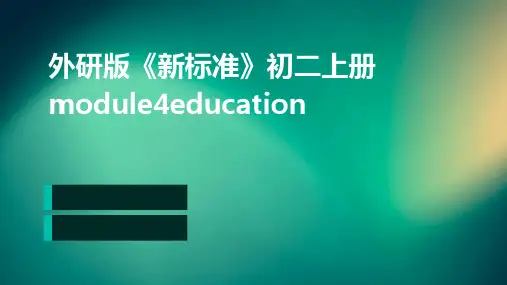
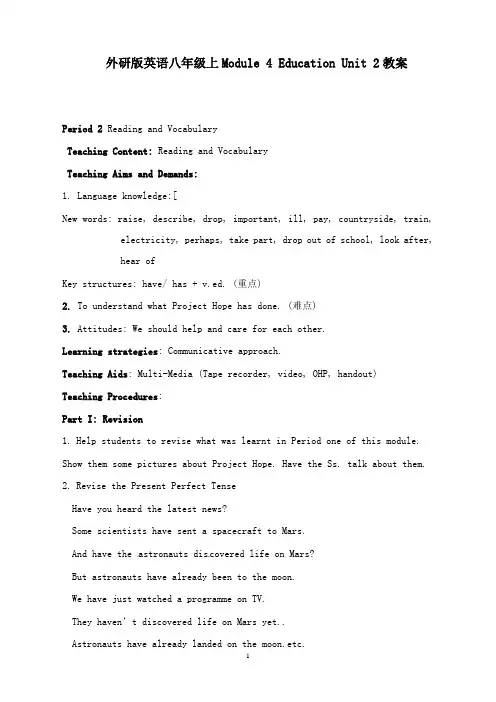
外研版英语八年级上Module 4 Education Unit 2教案Period 2 Reading and VocabularyTeaching Content: Reading and VocabularyTeaching Aims and Demands:1. Language knowledge:[New words:raise, describe, drop, important, ill, pay, countryside, train, electricity, perhaps,take part, drop out of school, look after,hear ofKey structures: have/ has + v.ed. (重点)2. To understand what Project Hope has done. (难点)3. Attitudes: We should help and care for each other.Learning strategies: Communicative approach.Teaching Aids: Multi-Media (Tape recorder, video, OHP, handout)Teaching Procedures:Part I: Revision1.Help students to revise what was learnt in Period one of this module. Show them some pictures about Project Hope. Have the Ss. talk about them.2.Revise the Present Perfect TenseHave you heard the latest news?Some scientists have sent a spacecraft to Mars.And have the astronauts dis covered life on Mars?But astronauts have already been to the moon.We have just watched a programme on TV.They haven’t discovered life on Mars yet..Astronauts have already landed on the moon.etc.Part II : PreparationTask 1: Learn the new words.Directions: Label the pictures with the words.(1). Read through the words on the screen. Have the Ss. Repeat them after you.(2).Read the words separately and have them remember them.(3).Make some sentences with the words.(4) Call back the answers from the whole cla ss.Task 2: Read the table and talk about Project Hope.Directions:(1). Read through the table on the screen. Have the Ss. discuss their ideaswith another pair.(2). Call back some comments from the whole classPart III: Scanning and Skimming1.Task: Read the passage and choose the main idea.Directions:Step one: The teacher ask the Ss to read the passage “ Hope for the future”Step two: Ss read the passage and find the main idea, giving reasons for the choice given.Step three:Call back the answers from the whole class, having individuals read out the answer[2. Task: Match the words with their meaningsDirections:Step one: Ask the Ss to do activit y 4 individually. They can use a dictionary if necessary. Then check with a partner.Step two: Call back the answers from the whole class as complete sentences.3.Task: Answer the questions in activity 3 on page 29.Directions:Step one: Read through the questions and make sure the Ss understand what to do. Ss do activity 3 on page 29 individually and check with a partner. Step two: Call back the answers from the whole class, having individuals read out the answersPart IV : Dealing with expressions:1.Liu Sanzi is an eight-year-old boy from a village in Hunan Province. eight-year-old为合成形容词,一般要用连字符连接起来,而且year也不要用复数形式。
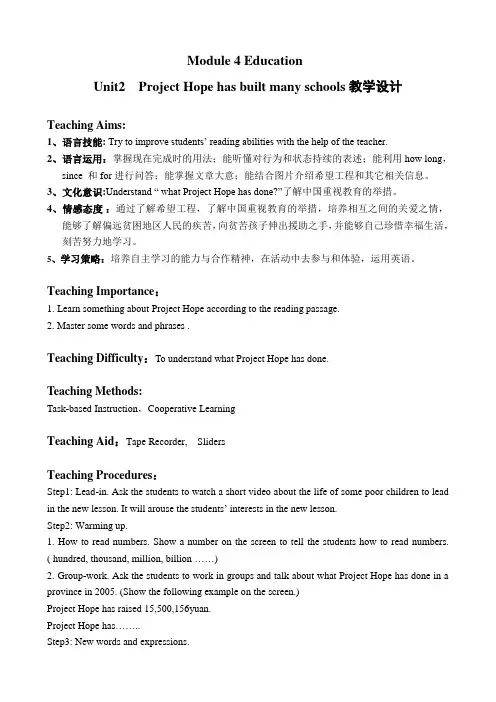
Module 4 EducationUnit2 Project Hope has built many schools教学设计Teaching Aims:1、语言技能:Try to improve students’ reading abilities with the help of the teacher.2、语言运用:掌握现在完成时的用法;能听懂对行为和状态持续的表述;能利用how long,since 和for进行问答;能掌握文章大意;能结合图片介绍希望工程和其它相关信息。
3、文化意识:Under stand “ what Project Hope has done?”了解中国重视教育的举措。
4、情感态度:通过了解希望工程,了解中国重视教育的举措,培养相互之间的关爱之情,能够了解偏远贫困地区人民的疾苦,向贫苦孩子伸出援助之手,并能够自己珍惜幸福生活,刻苦努力地学习。
5、学习策略:培养自主学习的能力与合作精神,在活动中去参与和体验,运用英语。
Teaching Importance:1. Learn something about Project Hope according to the reading passage.2. Master some words and phrases .Teaching Difficulty:To understand what Project Hope has done.Teaching Methods:Task-based Instruction,Cooperative LearningTeaching Aid:Tape Recorder, SlidersTeaching Procedures:Step1: Lead-in. Ask the students to watch a short video about the life of some poor children to lead in the new lesson. It will arouse the students’ interests in the new lesson.Step2: Warming up.1. How to read numbers. Show a number on the screen to tell the students how to read numbers. ( hundred, thousand, million, billion ……)2. Group-work. Ask the students to work in groups and talk about what Project Hope has done in a province in 2005. (Show the following example on the screen.)Project Hope has raised 15,500,156yuan.Project Hope has……..Step3: New words and expressions.1. Show the new words and expressions on the screen and then talk about them.2. Do some vocabulary exercise to strengthen the new words and expressions.Steps4: Do the Reading.1. Listening. Listen to the tape and choose the main idea for the text.Helping poor children go to school.Talk about education.Describing life for poor families.2. Fast Reading. Read the text quickly and match the main idea with each paragraph. (Show the ideas on the screen.)3. Intensive Reading. Read the text carefully to find out the answers to the following questions. (Show the questions on the screen.)4. True or False Sentences. Read the text again and check the following sentences. (Show the sentences on the screen.)5. Retelling. Fill in the blanks to retell the passage.Step5: Language Points.Step6: Exercise.Step7: Conclusion and Homework.1.Finish the exercise of Module4 unit2 in the Exercise Book.2.Remember the new words and expressions learnt in this lesson.。
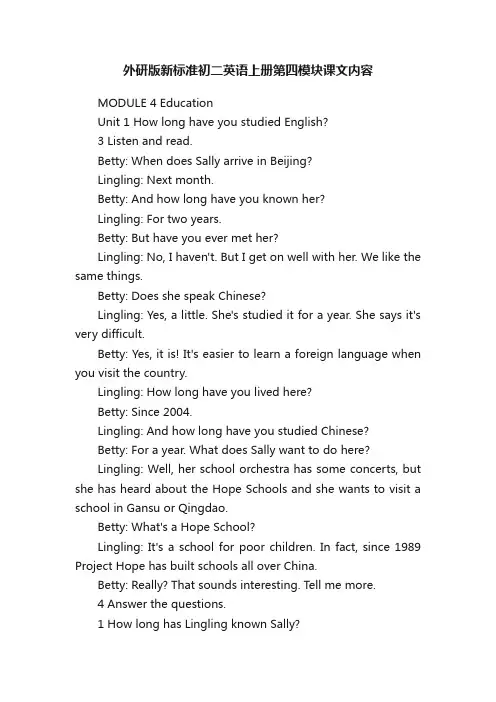
外研版新标准初二英语上册第四模块课文内容MODULE 4 EducationUnit 1 How long have you studied English?3 Listen and read.Betty: When does Sally arrive in Beijing?Lingling: Next month.Betty: And how long have you known her?Lingling: For two years.Betty: But have you ever met her?Lingling: No, I haven't. But I get on well with her. We like the same things.Betty: Does she speak Chinese?Lingling: Yes, a little. She's studied it for a year. She says it's very difficult.Betty: Yes, it is! It's easier to learn a foreign language when you visit the country.Lingling: How long have you lived here?Betty: Since 2004.Lingling: And how long have you studied Chinese?Betty: For a year. What does Sally want to do here?Lingling: Well, her school orchestra has some concerts, but she has heard about the Hope Schools and she wants to visit a school in Gansu or Qingdao.Betty: What's a Hope School?Lingling: It's a school for poor children. In fact, since 1989 Project Hope has built schools all over China.Betty: Really? That sounds interesting. Tell me more.4 Answer the questions.1 How long has Lingling known Sally?2 Does she still know her?3 How long has Sally studied Chinese?4 Is she still studying it?5 How long has Betty lived in China?6 Is she still living here?7 How long has Project Hope built schools all over China?8 Are they still building them?5 Answer the questions about the words and expressions in the box.difficult foreign get on well with1 What do you find difficult in learning English?2 How many foreign countries have you visited?3 Who do you get on well with in your class?6 Complete the sentences.1 Lingling knows Sally quite well, but she .2 Sally and Lingling get on well because .3 Sally hasn't been to China, so speaking Chinese .4 Sally is coming to China because .5 She has heard about the Hope Schools, so .6 Since 1989 Project Hope .Unit 2 Project Hope has built many schools.Read the passage and choose the main idea.1Helping poor children go to school2Talking about education3Describing life for poor families3 Answer the questions.1 Did Liu Sanzi finish studying?2 Why did Li Yinming stop going to school?3 When did he stop going to school?4 What has Project Hope raised money for?5 Did Shen's school have lots of books last year?6 Who has given money to Project Hope?4 Match the words and phrases with their meanings.drop out of school help pay for train1 to give money to buy something2 to do something for someone3 to leave before you've finished studying4 to teach someone to do something5 Answer the questions about the words and expressions in the box.abroad countryside electricity look after project iii1 Who looks after you when you're ill?2 Where do people go when they go abroad?3 Where is the nearest countryside to your school?4 What kind of projects do you do at school?5 What will happen without electricity?Learning to learnYou use words like and ,or and but to join two sentences. Project Hope has built schools. Project Hope has built libraries. Project Hope has built schools and libraries.Unit 3 Language in useLanguage practiceHow long have you studied Chinese? For a year.How long have you lived here? Since 2004.She's studied if for a year.Since 1989 Project Hope has built schools all over China.1 Work in groups of six. Make questions to ask everyone in the group.Try to find a different name to write for each answer.Find someone who ... Name1 has been to England.2 has worn glasses for more than three years.3 has lived in the same house for more than five years.4 has had the same best friend since primary school.5 hasn't been to the seaside since last year.A: Wang Tong, have you been to England?B: No, I haven't.A: Li Hug have you been to England?C: Ns, I have!A: OK. I'll write your name. Next question. Have you ...2 Write questions. Use How long have I has ... ?Lingling / study English? How long has Lingling studied English?1 Tony / know Daming?2 Betty / live in Beijing?3 Betty and Tony / study Chinese?4 Betty and Tony / be at Beijing International School?5 Betty / know about Project Hope?3 Complete the sentences with the correct form of the verbs and for or since.Lingling has studied (study) English forr nearly six years.1 Tony (know) Daming September 2003.2 Betty (live) in Beijing 2003.3 Betty and Tony (study) Chinese a year.4 Betty and Tony (be) at Beijing International School last year.5 Betty (know) about Project Hope one day. Lingling told her about it yesterday.4 Work in pairs. Write a short conversation. Use the questions and give your own answers. How long have you ... ?1 known your oldest friends2 studied English 4 known your teacher3 lived in your city 5 been at school5 Underline the correct answers.I have known / knew my best friend since we(l) have been / were four years old. Her name is Natalie. She (2) has lived / lived next door to me in Guangzhou but then her parents (3) have moved / moved to another city. We (4) have written / wrote letters to each other. Luckily, her dad (5) has just started/just started a new job so they (6) have moved / moved back to Guangzhou. I am very happy! We (7) have seen / saw each other every day since she came back.6 Complete the passage about Project Hope. Use the correct form of thewords and expressions in the box.abroad difficult drop out of help pay for study thousands of trainProject Hope has raised money from people at home and abroad. It helps (1) children who can't go to school. It (2) their education. It builds schools and libraries and it (3) teachers. Some children in the countryside (4) school because they have to (5) with the farm work. We can go to school and (6) , but for poor children it's (7) to go to school.8 Match the words with the numbers.1 a billion a 6.22 four thousand b 1,000,000,0003 three hundred and twenty c 9.434 five million d 4,0005 six point two e 12.366 twelve point three six f 3207 nine point four three g 5,000,0009 Replace the numbers in the passage with words.Project HOPE is also the name of a world organisation thatworks to improve health care in the world. Project HOPE has worked around the world for 46 years. It has trained over 2,000,000 people to help poor children and adults. Project HOPE gives about 1,000,000 dollars of help to 20 to 30 countries. Over 5,000 Workers and teachers have worked for Project HOPE since it started.1 46 4 202 2,000,000 5 303 1,000,000 6 5,000Around the worldOxfamOxfam is an organisation which raises money for different projects. It helps poor people in countries around the world.Oxfam pays for clean water and schools. It has shops and sells fruit and coffee grown by poor farmers. It pays a fair price for their work. Rich people give clothes to the shops. Oxfam sells them and uses the money to pay for its projects.。
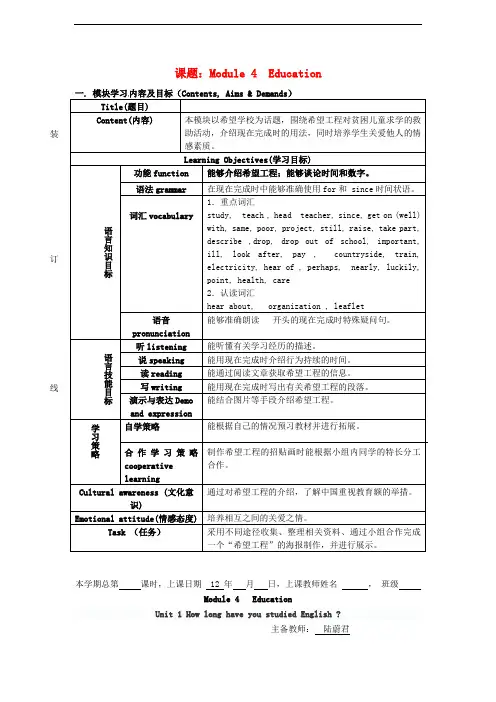
课题:Module 4 Education一. 模块学习内容及目标(Contents, Aims & Demands )Title(题目)Content(内容)本模块以希望学校为话题,围绕希望工程对贫困儿童求学的救助活动,介绍现在完成时的用法,同时培养学生关爱他人的情感素质。
Learning Objectives(学习目标)语言知识目标功能function 能够介绍希望工程;能够谈论时间和数字。
语法grammar 在现在完成时中能够准确使用for 和 since 时间状语。
词汇vocabulary1.重点词汇study, teach , head teacher, since, get on (well) with, same, poor, project, still, raise, take part, describe ,drop, drop out of school, important, ill, look after, pay , countryside, train, electricity, hear of , perhaps, nearly, luckily, point, health, care 2.认读词汇hear about, organization , leaflet 语音pronunciation 能够准确朗读 开头的现在完成时特殊疑问句。
语言技能目标听listening能听懂有关学习经历的描述。
说speaking 能用现在完成时介绍行为持续的时间。
读reading 能通过阅读文章获取希望工程的信息。
写writing 能用现在完成时写出有关希望工程的段落。
演示与表达Demo and expression 能结合图片等手段介绍希望工程。
学习策略自学策略合作学习策略cooperative learning能根据自己的情况预习教材并进行拓展。
制作希望工程的招贴画时能根据小组内同学的特长分工合作。
天津外国语大学附属滨海外国语学校外研初中二年级上册Module 4EducationUnit 3Language in usenearlyluckilypointorganizationhealthcareleaflet New words几乎幸运地点;分;指着;指组织;机构健康护理;照料传单Language practiceHow long have you studied Chinese? For a year.How long have you lived here? Since 2004.She’s studied it for a year.Since 1989 Project Hope has built schools all over China.Write questions. Use How long have/has…?1.Tony/ know Daming?How long has Tony known Daming? 2. Betty/ live in Beijing?How long has Betty lived in Beijing? 3. Betty and Tony/study Chinese?How long have Betty and Tony studied Chinese?4. Betty and Tony/be at Beijing International School?How long have Betty and Tony been at Beijing International School?5. Betty/know about Project Hope?How long has Betty known about Project Hope?Complete the sentences with the correct form of the verbs and for or since .1.Tony _________ (know) Daming _____ September 2003.2. Betty _______(live) in Beijing ____ 2003.3. Betty and Tony ____________ (study) Chinese ____ a year.4. Betty and Tony _________ (be) at Beijing International School _____ last year.5. Betty _________ (know) about Project Hope ___ one day. Lingling told her about it yesterday.has known since has lived since have studied for have been since has known forWork in pairs. Write a short conversation.A: Hello, Mary!B: Hello, Daming!A: May I ask you some questions?B: Sure! Go ahead.A: How long have you known your oldest friends? B: For almost ten years.A: How long have you studied English?B: Since 2000.A: How long have you lived in your city?B: Since the day I was born.A: How long have you known your teacher?B: For one year.A: How long have you been at this school?B: Since 2005.Do Exercise 5 on page 31: Underline the correct answers.1. were2. lived3. moved4. wrote5. has just started6. have moved7. have seenComplete the passage about Project Hope. Use the correct form of the words in the box.abroad difficult drop out of help pay for study thousands of train Project Hope has raised money from people at home and abroad. It helps ___________ children who can’t go to school. It _______ their education. It builds schools andlibraries and it _______ teachers. Some children in the countryside ___________thousands of pays for trains drop out ofschool because they have to ________ with the farm work. We can go to school and ______, but for poor children it’s _______ to go to school.helpstudydifficult(1) How long has Charlie lived in Beijing?(2) How long has Mary lived in Beijing?(3) Where did she live before that?(4) How long has she studied English?Listen and answer the questions:He has lived in Beijing since 2002.She has lived in Beijing for seven years.She lived in a small village.She has studied it for six years.(5) When did she start learning it? She studied it when she was seven.(6) How long has Charlie studied Chinese?He has studied Chinese since June.Match the words with the number.a billionfour thousandthree hundred and twenty five millionsix point twotwelve point three six nine point four three a. 6.2b. 1,000,000,000c. 9.43d. 4,000e.12.36f.320g. 5,000,000Replace the numbers in the passage with words.(1) 46 ___________________(2) 2,000,000 _____________(3) 1,000,000 _____________(4) 20 ___________________(5) 30 ___________________(6) 5,000 _________________forty-six two million one million twenty thirty five thousandOxfam----Oxford Committee for Famine Relief牛津饥荒救济委员会Oxfam International is a confederation of 12 organizations working together with over 3,000 partners in more than 100 countries to find lasting solutions to poverty, suffering and injustice. With many of the causes of poverty global in nature, the 12 affiliate members of Oxfam International believe they can achieve greater impact through their collective efforts.Oxfam is an organization which raises money for different projects. It helps poor people in countries around the world.Oxfam pays for clean water and schools. It has shops and sells fruit and coffee grown by poor farmers. It pays a fair price for their work. Rich people give clothes to the shops. Oxfam sells them and uses the money to pay for its projects.牛津饥荒救济委员会是一个为许多不同项目筹集资金的组织。